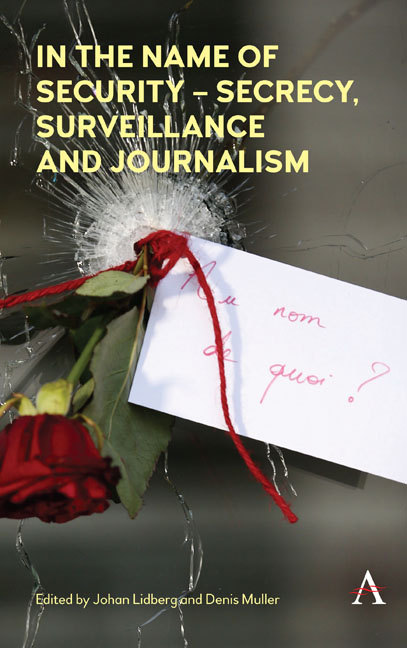Book contents
- Frontmatter
- Contents
- List of Tables
- Introduction
- Chapter 1 The Public Privacy Conundrum – Anonymity and the Law in an Era of Mass Surveillance
- Chapter 2 Undesirable Types – The Surveillance of Journalists
- Chapter 3 Surveillance and National Security ‘Hyper- Legislation’ – Calibrating Restraints on Rights with a Freedom of Expression Threshold
- Chapter 4 The Ethics of Reporting National Security Matters
- Chapter 5 When One Person's Noble Whistleblower Becomes Another's Poisonous Leaker
- Chapter 6 Who Watches the Watchmen? Access to Information, Accountability and Government Secrecy
- Chapter 7 Eyes and Ears in the Sky – Drones and Mass Surveillance
- Chapter 8 Looking over My Shoulder – Public Perceptions of Surveillance
- Chapter 9 Journalism and National Security in Three BISA Countries – Brazil, India and South Africa
- Chapter 10 Journalism and National Security in the European Union
- Chapter 11 The Security Reporter Today – Journalists and Journalism in an Age of Surveillance
- Conclusion: Journalism and the State of Exception
- Contributors
- Index
Chapter 9 - Journalism and National Security in Three BISA Countries – Brazil, India and South Africa
Published online by Cambridge University Press: 21 June 2018
- Frontmatter
- Contents
- List of Tables
- Introduction
- Chapter 1 The Public Privacy Conundrum – Anonymity and the Law in an Era of Mass Surveillance
- Chapter 2 Undesirable Types – The Surveillance of Journalists
- Chapter 3 Surveillance and National Security ‘Hyper- Legislation’ – Calibrating Restraints on Rights with a Freedom of Expression Threshold
- Chapter 4 The Ethics of Reporting National Security Matters
- Chapter 5 When One Person's Noble Whistleblower Becomes Another's Poisonous Leaker
- Chapter 6 Who Watches the Watchmen? Access to Information, Accountability and Government Secrecy
- Chapter 7 Eyes and Ears in the Sky – Drones and Mass Surveillance
- Chapter 8 Looking over My Shoulder – Public Perceptions of Surveillance
- Chapter 9 Journalism and National Security in Three BISA Countries – Brazil, India and South Africa
- Chapter 10 Journalism and National Security in the European Union
- Chapter 11 The Security Reporter Today – Journalists and Journalism in an Age of Surveillance
- Conclusion: Journalism and the State of Exception
- Contributors
- Index
Summary
Introduction
There is an emerging consensus that the four institutional pillars of democracy – legislature, executive, judiciary and media – function differently, albeit in varying fashion, among the nations bracketed as ‘emerging’ or ‘developing’. Initially the intention of this chapter was to include all BRICS countries – Brazil, Russia, India, China and South Africa – but after preliminary research, it was concluded that the legislature and executive branches in Russia and China possess significantly more powers than in the other BRICS countries (Wahl- Jorgensen and Hanitzsch 2009). The judiciaries in China and Russia are not, at this point in time, independent enough to make for a fair comparison with the other BRICS countries (ibid). Such political and legal realities severely impinge upon the independent and free functioning of the media, especially investigative journalism, in Russia and China (Josephi 2011). It was therefore decided to limit this chapter to the BISA countries – Brazil, India and South Africa.
The relationship between actions by the state, such as new laws, and journalism has become even more pertinent and crucial in the post– 9/11 period, when most countries, whether developed, developing or least- developed, have sought to tackle real or percieved terror- related attacks against them and terror activities on their soils. Like others, BISA too have enacted dozens of new laws, the executives in these nations have interpreted them in different ways and the respective judiciaries have set contrary and contradictory precedents. Therefore, it is imperative to study and analyse how laws pertaining to general security, and national security in particular in the past 15 years have impeded or aided investigative journalism in their respective countries. Is investigative journalism encouraged or oppressed by the new laws in these nations?
If the answer to the question is that investigative journalists are under threat or cowed by the state, its laws and their interpretations, this is a major threat to independent media and its professionals. In two of the three BISA nations, Brazil and India, there are several reports of state- inspired or statedriven violence against journalists, or serious charges, such as sedition, filed against them (RSF 2016).
- Type
- Chapter
- Information
- In the Name of Security - Secrecy, Surveillance and Journalism , pp. 173 - 194Publisher: Anthem PressPrint publication year: 2018



